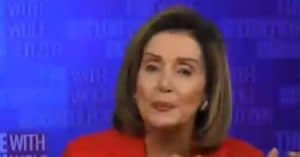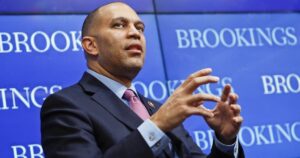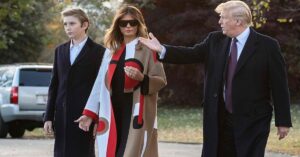CNN Debate Highlights Partisan Divide Over Jan. 6
In a heated discussion on CNN, prominent figures exchanged viewpoints on Nancy Pelosi's role in the January 6 committee and President Trump's influence over the Capitol riot, igniting a debate that laid bare partisan divisions, the Daily Caller reported.
On January 6, 2021, the United States Capitol was stormed by hundreds of individuals during the certification of the electoral college votes. This significant event led to over 1,500 arrests by the FBI as authorities sought those responsible for the unprecedented breach. Representation from both sides of the political spectrum participated in a debate over the incident on CNN.
Jim Acosta, Maria Cardona, and Republican strategist Brad Todd engaged in a discourse marked by sharp differences. Todd critiqued Pelosi for what he described as her utilizing the January 6 committee for political advantage. According to him, this move contributed to an ongoing narrative against Donald Trump.
Pelosi's Decision Sparks Republican Boycott
Controversy surrounded Pelosi's decision to block Republican representatives Jim Jordan and Jim Banks from the January 6 committee. In their place, she appointed fellow Republicans Liz Cheney and Adam Kinzinger, who were known critics of Trump. The exclusion of Jordan and Banks from the panel led to a boycott by House Republicans.
Brad Todd expressed that voters held Trump accountable for the turmoil on January 6, affecting his political stature. He commented, "I wouldn’t expect Donald Trump would apologize... nor do I expect Democrats to apologize for trying to undo his presidency."
Political Repercussions of January 6
The fallout from the events at the Capitol also included strong reactions from various political figures. Vice President Kamala Harris and Governor Tim Walz attacked Trump in subsequent speeches, casting him in a negative light. In a speech on September 1, 2022, President Joe Biden labeled Trump and his followers as threats to democracy, underscoring the enduring tension and division spurred by the Capitol riot.
Amid this political drama, Nancy Pelosi's remarks prior to the January 6 event revealed her personal frustration with Trump. She had been quoted expressing a desire to confront him physically, a reflection of the intense emotions stirred by his presence and actions.
Partisan Tensions Over Committee Membership
Brad Todd criticized Pelosi's actions, which included denying Jordan and Banks committee roles while elevating Cheney and Kinzinger, as strategic political maneuvering. This interpretation was part of a broader critique of how Pelosi handled the situation to gain partisan leverage.
In contrast to the Republican strategist's view, other participants in the debate focused on Trump's responsibility for inciting the crowd that eventually stormed the Capitol. Despite the criticism, Trump maintained his position without offering an apology, something Todd suggested was unlikely from either Trump or his political opponents.
Broader Implications of the Capitol Riot
The repercussions of January 6 continue to ripple through the political landscape of the United States. Brad Todd noted, “Jim, look at our own polling…January 6th was a dark day in the history of our country. Donald Trump bears a lot of responsibility for that.”
The gravity of the riot and its aftermath prompted Pelosi to lead an impeachment charge against Trump shortly thereafter. Though the House passed the impeachment resolution, Trump was acquitted by the Senate in February 2021.
Pelos’s Actions and Trump's Legacy
Through her handling of the January 6 committee, Pelosi's actions became a focal point in the political discourse surrounding the event's investigation. The exclusion of certain Republican voices from the committee was seen by some as a maneuver that fostered division rather than unity.
In the wake of these events, political narratives regarding January 6 were not solely about accountability but also about influence and control in shaping the public's memory. Both parties utilized the events to solidify their narratives and mobilize support.
While the debate continued to unfold on CNN, it was clear that the events of January 6 and the subsequent handling by political leaders remain deeply contentious, with each side attributing motives and consequences differently. The ongoing dialogue reflects a nation grappling with the legacy of that day and its impact on American political life.




